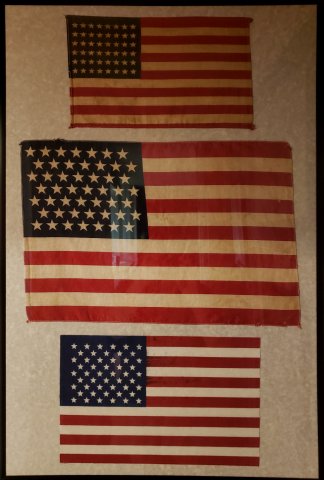During my lockdown-inspired nesting phase, I tacked the master bedroom closet first, and was thrilled to find two flags from my long-ago childhood. I calculate that they had survived at least six moves over four states: safe, albeit neglected, rolled up in a cardboard tube.
Many people have found this restricted time to be inspirational, and I am one of them. Finally, finally, my long-forsaken flags have been cleaned, mounted, and proudly displayed on our wall.
It turned out to be quite a project, especially trying to complete it with limited resources: this was during the severest phase of the lockdown, and I couldn't follow my usual practice of browsing frames at Jo-Ann's and Michael's until I found a size that inspired me. I did my browsing online instead, which was much less satisfactory. Nothing seemed right—certainly nothing that I could get handily.
I scoured the house for unused frames. I even considered temporarily cannibalizing a picture that had not yet found a home on our walls. But nothing was right.
So I reluctantly set aside the project and moved on. That was when I found, well-hidden in an obscure corner of our daughter's room, an unused poster frame. (Janet, if you were saving it for something, I owe you a frame.) It would be perfect, I thought, if only I had a 50-star flag to complete the set.
It was no easier to find the right flag than the right frame. They were either too big, too small, or too expensive. Finally, I looked away from all the flag stores and found one of the right size at Target. And it certainly wasn't too expensive: the price was $1.00. I placed my order.
Because of the pandemic-imposed restrictions, when Porter picked it up for me, he was unable to browse for the best quality—assuming there was one of better quality—but took what was handed to him. Somebody did a lousy job of print alignment. No matter; it does the job. Someday I may replace it with a better. Or not.
I'm proud to be one of the dwindling generation that has lived under three different American flags. Four, if you count the Bennington flag that was popular to fly during the Bicentenniel celebration of 1976.
Happy Flag Day to you all!
Permalink | Read 1477 times | Comments (0)
Category Hurricanes and Such: [first] [previous] [next] [newest] Everyday Life: [first] [previous] [next] [newest] Inspiration: [first] [previous] [next] [newest]
Mostly we are continuing to work quite contentedly on our projects at home, supplemented by regular Skype sessions with grandchildren, a weekly Zoom choir chat, and other not-in-person forms of communication. Domestically, postal mail communication is working fine, seemingly normal. Internationally it is a very different story. Since the arrival of my 56-day Priority Mail package, our folks in Switzerland have received none of the letters I have sent (numbering at least seven). Given that my friend at our local post office once told me that the only postal system in the world that is better than America's is the Swiss system—this is not normal.
At last I'm feeling comfortable with my grocery shopping habits—not related to COVID-19, but to product availability. That is, I'm confident enough again not to buy something as soon as I see it, but to go back to my normal procedure of waiting until the product is on sale. Today I passed up the opportunity to buy our favorite brand of toilet paper, because it was not on sale. That says a lot.
However, I did NOT pass up the chance to buy my first bag of King Arthur flour since all this started! It was all I could do to restrain myself from buying more than one. (The store set no limits, but we King Arthur fans have to look out for one another.) The price was good, too ($3.99 for five pounds).
I also ventured out to the library to return two books and pick up one that had become available. The library takes in returned books in the vestibule, before you enter the main part of the facility. From there the returned books are put into a three-day quarantine before being reshelved. In the library itself masks are recommended but not required. All the staff but only some of the patrons were wearing masks the day I visited. Not one of all the children I saw was masked—which I found disturbing, given that children are the most likely to spray their coughs and sneezes randomly. Don't tell me you can't make a child wear a mask. I know a little boy who as a two- and three-year-old cancer patient had to wear a mask every time he went out in public. If he could manage it, certainly much older children can.
Our first new venture was participating in Communion on the Driveway at church. We joined the others who watched most of the service from home, then drove to church for the drive-through experience, receiving communion (just the bread) into our hands from long, slender tongs that looked for all the world like chopsticks. Even though our church is officially reopened for public worship, the restrictions are so great that we will be patient with the online version for a while longer. If we couldn't get the Eucharist any other way, we might have to submit to the restrictions, but we'll face that if we come to it.
The other big event for us was HAIRCUTS! I had already taken the scissors to my bangs once, but was still feeling shaggy and uncomfortable, especially with the advent of summer heat. Porter had long ago changed his hairstyle to keep his ever-lengthening hair out of his eyes, but it was time and more than time for both of us. For a long time, our neighbor, a semi-retired barber, has been cutting Porter's hair, but he has been out of town for weeks. I usually go to SuperCuts, but am not ready to have that kind of public contact yet. Finally, our neighbor returned—to a line-up of people anxious for his services.
Not only are we both feeling much, much better, but this was probably my most enjoyable haircut, ever. I know some people like getting haircuts, but for me it is only slightly preferable to going to the dentist. First, there's the stress of wondering how the haircut will turn out. (Don't tell me that I wouldn't have that stress if I paid more for a haircut; I've discovered that doesn't help.) This time, I didn't really care. I just wanted the job done. (And it turned out to be one of my best haircuts, anyway.) But that's not the worst stress of getting a haircut: I hate hair salon conversations. Every once in a while I'll get a stylist who will just cut my hair, but most want to talk. Over the years I've learned to do the small-talk thing, but it costs me a great deal of effort and leaves me exhausted.
But this was soooo different! As I said, this time the barber was our neighbor, and I am accustomed to talking with him. Besides, the conversation was interesting—not the kind of discussion you can have with a stranger. We might as well have been eating dinner at Outback together, except of course that my hair was shorter when we were done. Never has getting a haircut been so easy and so rewarding!
And there's one more benefit that came from our shearing: I have my husband back. Now that Porter's hairstyle is back to normal, he looks like himself to me. Y'all probably laughed when I said that the first time our rector got a radical haircut I thought it was someone else up at the altar until he spoke. Not recognizing one's own husband is even sillier, but that's prosopagnosia for you. I mean, I knew it was him, but ... it's good to have him back.
Permalink | Read 1288 times | Comments (1)
Category Hurricanes and Such: [first] [previous] [next] [newest]
This year my children and my husband got together for an entirely different kind of Mother's Day treat: a selection of Jeni's Ice Cream delivered in dry ice to our door.
My favorite Connecticut ice cream store, Grass Roots, had an ad on Facebook that said, Your momma called: she wants Grassroots ice cream. I laughed in appreciation when I saw it, knowing that my sister-in-law might get something from Grass Roots for Mother's Day, but it was out of the question for me.
And then this happened. It wasn't Grass Roots, but it was delicious and had the Grass Roots approach to unusual flavors.
First, of course, we played with the dry ice. It's much more fun if you have grandchildren to share it with. And to no one's surprise, there's a lot less dry ice left when it's delivered to Florida than when it's delivered to New Hampshire. Still, we enjoyed the moment. Here's the short version.
Now for the ice cream itself, in order of our trials. Boy, was that the wrong word. It was hardly a trial to enjoy these treats!
Blackout Chocolate Cake A chocolate ice cream quadruple threat with cake, extra-bitter fudge and chocolate pieces. Fantastic. Rich, darkly chocolate. Better than Publix's Chocolate Trinity? I don't know. Give me a large bowl of each side by side and I'll see what I can figure out. It might take several experiments....
Brown Butter Almond Brittle Brown butter almond candy crushed into buttercream ice cream. Is is possible that there could be something better than chocolate? I found this only moderately promising from the description, but oh, my what a flavor! A little almond, a little caramel, a little reminiscent of the wonderful milk ice cream we ate in Japan. It's subtle, but may even be my favorite of the Jeni's flavors, since Publix does so well in the chocolate department.
Skillet Cinnamon Roll Dark caramel, cream cheese, pastry, and cinnamon (lots of it). Not in the same league as the first two, but definitely good. If I liked cream cheese frosting more than I do, it might be great. I'd happily eat it again.
Caramel Pecan Sticky Buns (Dairy-Free) Rich coconut cream loaded with sticky bun dough, dark caramel, and roasted pecans. Fortunately, Porter liked this. It was far from his favorite, but he certainly made sure it wasn't wasted. I'm glad I tried it, but in a word, no. First, the "dairy-free" label is a big warning sign, and makes me think fake from the beginning, with overtones of margarine, artificial sweeteners, and decaffeinated tea. Then there's the c-word: coconut. I enjoy coconut in savory Indonesian dishes, and that's about it. Not at all in anything sweet. Pecans are another thing I like only in certain contexts (like salads) but desserts is not one of them. Sticky bun dough and caramel? Now those are winners, but frankly the overwhelming flavor was coconut—which is why Porter liked it and I didn't.
Pineapple Upside Down Cake Sweet-tart pineapple with golden cake, red cherries, and a caramel swirl. This is what I opened when I turned the coconut-flavored ice cream over to Porter. It seemed fair: he doesn't care much for pineapple; I do. This one was smooth and delicious, but the other tastes were overwhelmed by the pineapple.
Lemon & Blueberry Parfait Tart and uber creamy lemon with from-scratch blueberry jam in fresh cultured buttermilk and cream. Delicious, and the lemon makes it very refreshing. I love lemon, and this has an excellent flavor, but it does overwhelm the blueberry.
Sweet Cream Biscuits & Peach Jam Buttermilk ice cream, crumbled biscuits, and swirls of jam made with Georgia peaches from "The Peach Truck." Very yummy. The biscuits are noticeable by both taste and texture, just about the right amount in each case. The peach flavor is excellent.
Salty Caramel Fire-toasted sugar with sea salt, vanilla, and gress-grazed milk. A perfect balance of salty and sweet. This also was delicious, though I'll admit it was even better when paired with some Chocolate Trinity. I love the combination of chocolate and caramel.
Brambleberry Crisp Oven-toasted oat streusel with sweet-tart bramble berry jam of blackberries and blackcurrants layered throughout vanilla ice cream. I'm running out of things to say other than "delicious." But that it was. The vanilla is a better foil for the berries than lemon was for the blueberries. The oat streusel is reminiscent of a good-quality granola or an oatmeal cookie.
If I were to be blessed with such a gift on another occasion, what would I want to repeat? Any of them except the dairy-free variety would be welcomed, but Number 1 on my list would clearly be the Brown Butter Almond Brittle. It was the biggest surprise of all the flavors, and the most memorable. If there's an equivalent elsewhere I haven't found it.
I went over to the Jeni's website to check out some of the other flavors they offer. I'd definitely want to try their Gooey Butter Cake, in honor of our most pleasant visit to my nephew when he lived in St. Louis. Maybe Churro, or Cream Puff, or Boston Cream Pie, or Pistachio & Honey. Texas Sheet Cake and Dark Chocolate Truffle sound good, but both are dairy-free so I would steer clear of them. Porter would love Goat Cheese with Red Cherries, but I don't think I'd offer to help him finish that pint.
Brown Butter Almond Brittle aside, the best part of Jeni's is the variety and the opportunity to taste unusual flavors. I'm really thinking Grass Roots should get into the delivery business. :) Or maybe not; to do that they might have to grow too much and lose their small, local-business cachet. But it's a thought.
[Editor's Note: This is homeschooling. The school year has ended and thus Wyatt has more time to devote to writing, setting his own goals and an ambitious schedule.]
It could be said that I am the absolute worst person to take the long view of current times. I’ve only been around for 15 years and haven’t known the slightest thing about current events until at most three years ago, when I took to them like a fish to water. And I live in New Hampshire, the whitest state in the Union. This is hardly beneficial to interpreting recent events, whether they be the long term effects of coronavirus, or the recent riots that have shaken the country. However, sometimes the unattached observer is best. It is a terribly interesting time, from a historical perspective. Of course, we must remember the Chinese proverb, “May you live in interesting times.” I don’t think it was meant as good wishes.
First of all, things are not all doom and gloom. We must remember that the standard of living is higher today than ever before. We would all be living at the highest standard of living a major industrial country has ever had, if not for the coronavirus. The Spanish flu was just as deadly as the coronavirus. Yet, everyone went out, and many died. This was because, a hundred years ago, the world couldn’t afford to shut down. Now, we can all stay inside for three months, and our biggest concern is our social life. The sixties were a turbulent time, as turbulent as today politically. The seventies were marked by gas shortages. Life may have been better four months ago, but this is the first dip we’ve seen since the 2008 crash, and all the aftershocks of that. It has taken us all by surprise. We’ll be recovering from this for a long time. But, we will recover from it, in some form or fashion. How much we will lose forever, and how much will continue as it was before, remains to be seen, but we will recover.
I think that the recent riots are as much an indication of economic downturn, perceived as being forced by the authorities, as of the tragic death of George Floyd. The police have enforced lockdowns and have become quite unpopular in some places. It is a simple fact that, while the death of George Floyd is tragic, it is far from the first of its kind. Many examples of police brutality have taken place before, on both blacks and whites. So, why did these ones produce an unparalleled amount of rioting and destruction? I think it is the economic downturn, which has hurt many in the black community. Therefore, there are lots of poor people, black and white, who aren’t allowed to work. Thus, they have nothing to do, other than try and spend unemployment checks. They get into the streets because they dislike the police, and the police have given them another, poignant reason to dislike them. It is thrilling to finally break the social distancing guidelines, thrilling to put oneself at risk for a cause. Then, when they find out that the nation is by and large behind their message, some of the more reckless ones begin looting, and burning police stations. I think it is the natural result of keeping all these people locked up for so long. There was dry wood. The death of George Floyd was the match. That is how I view the situation.
It is amazing how swiftly social distancing was abandoned. If you protest and loot buildings, you are immune to coronavirus, apparently. The rapidity with which the social distancing rule was dropped was amazing. One day, nobody ever talked about anything else. The next, every major player in the world was silent, except for maybe right wing outlets, though I doubt that the protesters’ health is the first thing on their mind. Now, former Vice President Biden is going to attend George Floyd’s funeral, where no social distancing is being mandated. That is quite the risk for the Vice President, who is already elderly, the number one thing to make you vulnerable. It is now politically expedient to ignore social distancing, so it is ignored.
This is leading us into one of the most bitter games of political maneuvering I’ve ever seen, either myself or in history. Usually, when there is a crisis, the nation comes together. We did it in WWII, we did it in the Mexican war in the 1840’s, we did it in the Great Depression, we’ve done it many times. So, why can’t we do it now? It is because both parties have tried and succeeded to make things black and white. Democrats are terrible, say the Republicans, because they want to steal your money and give it to people who aren’t working. Republicans are racist, say the Democrats, because they don’t want to give their money to poor people, and everyone knows that colored people are poor because of Republicans’ racism. And so it goes, getting nastier and nastier, until each side has been convinced the other is entirely evil, and if “those people” get control of the country, it will fall apart. I think this has prevented us from coming together.
It has come up for an interesting election, in that if either candidate were not running against the other, I would assume that they would lose. Vice President Biden is going senile before our eyes, and I don’t think he can physically handle the presidency, the most stressful job on the planet, for four years. I cannot judge his chances until he picks his VP. President Trump was turned to by the Republicans as their last desperate hope. And it worked. However, while he started off well enough, events out of his control have led to him being in a bunker for fear that the White House might be stormed by protesters. Though no one could have stopped the coronavirus, any president that has to be in a bunker has begun to lose control of the country. This is why a European political system with more than two parties would be nice.
So, times may look grim these days. But, they are in some ways the nicest days ever. Remember that oil was once so sought after that wars were fought for it, repeatedly, in the Middle East, not so long ago. Now, we are pulling out of there, a place the United States has been fighting since before I was born, because we don’t need oil anymore. We will need oil again, surely, but I don’t think we’ll need as much for a long time, as people become more accustomed to not driving. It is a time of change. I don’t like it very much, and I think that some of the things being lost will hurt American culture for many years to come. But there are benefits, and I think that the world will come out a new place. The only question is to whom the prize of shaping it will go. Democrats or Republicans? The United States or China? Only time will tell.
Permalink | Read 1406 times | Comments (1)
Category Hurricanes and Such: [first] [previous] [next] [newest] Guest Posts: [first] [previous] [next] [newest]
The world may be facing some very serious difficulties right now, but the world has always faced serious difficulties.
One of the best ways to combat the depression and ennervation that come during such times is with laughter. Not course, mocking laughter, but the kind of bright, wholesome, joyful comedy that lifts the spirit.
Here's one I found yesterday. It depends for most of its comedy on familiarity with the old television show, Monk, so I know several of my readers might not find it as funny as we did. But I hope you enjoy it anyway. (The fun part starts at about 1:29.)
Permalink | Read 1397 times | Comments (5)
Category Hurricanes and Such: [first] [previous] [next] [newest] Just for Fun: [first] [previous] [next] [newest]
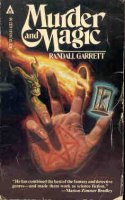
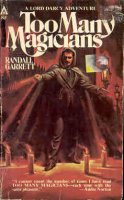
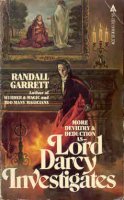 Murder and Magic, by Randall Garrett (Ace, 1979; written 1964-1973)
Murder and Magic, by Randall Garrett (Ace, 1979; written 1964-1973)
Too Many Magicians, by Randall Garrett (Ace, 1966)
Lord Darcy Investigates, by Randall Garrett (Ace, 1981; written 1974-1979)
A recent sermon brought to mind this line from Murder and Magic: "Black magic is a matter of symbolism and intent." I hasten to explain that Fr. Trey was not preaching about black magic; he only used the phrase, "form, intent, and matter," which set off my easily-distracted brain. He is not responsible for the fact that my mind is a junkyard of random snippets of stories and poems.
Be that as it may, it caused me to realize that it had been some time since I last read Randall Garrett's clever and enjoyable stories about Lord Darcy, a detective living in an alternate universe, in which King Richard I of England did not die from an arrow wound in 1199, but lived to found the mighty Anglo-French Empire, under a centuries-long Plantagenet dynasty still reigning in the 1970's.
In this world, the art of magic developed into a science, and what we call science was relegated to the hedgerows and backwaters. This topsy-turvy scenario serves Garrett very well as he weaves his murder mysteries and detective puzzles.
Too Many Magicians is a novel; the other two books are collections of shorter stories.
With a hat tip to my friend Dr. Gaunce Lewis, who introduced me to these delightful stories, I picked up Murder and Magic again, noting with shock that it had been more than a decade since I had read it. As with any good book revisited, I found something new in this reading. Garrett is known for his wordplay and allusions, some of which are detailed in the Lord Darcy Wikipedia article. However, the article misses what to me is a very obvious homage to Dorothy Sayers' novel The Nine Tailors, in Garrett's story, "The Muddle of the Woad." I love making connections like that! I say it is obvious, but somehow I missed it the countless previous times I read Murder and Magic. I guess it is like most puzzles—the solution is obvious once you see it.
Too Many Magicians successfully spins the protagonists' adventures to novel-length, with special delights for fans of Rex Stout's Nero Wolfe books. It repeats the "Black magic is a matter of symbolism and intent" line, which may help explain why that has stuck in my memory. My re-reading pleasure this time was enhanced by the following paragraph:
Physician, heal thyself, Master Sean throught wryly. The phrase was archaic only in that Healers no longer relied on "physick" to heal their patients. When the brilliant genius, St. Hilary Robert, worked out the laws of magic in the Fourteenth Century, the "leech" and the "physician" might have heard their death knell ringing from the bell tower of the little English monastery at Walsingham, where St. Hilary lived. Not everyone could use the laws; only those who had the Talent. But the ceremony of healing by the Laying On of Hands had, from that time on, become as reliable as it had been erratic before. (p. 22)
What makes this paragraph interesting is that it illustrates the Baader-Meinhof phenomenon. I'd never heard of the English village of Walsingham until our church's new rector came, less than two years ago—but ever since I've been encountering the town in unexpected places, including two separate detective fiction series. To be sure, both of those series are set in Britain; I will be shocked if I encounter Walsingham in the Leaphorn & Chee books.
Lord Darcy Investigates takes us back to the short story format, and is just as much fun as the others. Here's my favorite quote from that book:
"Like all great detectives, my lord, you have the ability to leap from an unjustified assumption to a foregone conclusion without passing through the distance between. Then you back up and fill in."
I see no reason not to recommend these books as SFGC (safe for grandchildren), but skip reading about the author himself if you want to continue to give him the respect these books deserve. Learning more about the real lives of one's heroes is often a strong cure for the sin of idolatry.
The coronavirus has really brought out the culture differences throughout both the world and the country. It has sharply contrasted the mindset of China and the mindset of the West. Within America the divide between Urban and Rural has never been clearer. Both of these are interesting and important aspects of the future.
The Chinese got hit by this coronavirus first, and I’ve heard a lot about what they do from my dad, who works with Chinese kids, teaching them English. Since kids are less tight-lipped than adults, we probably know a lot more about China than most people and were hearing higher death numbers before they were revealed to everyone. China is the embodiment of the centralized state, at least in the modern day. The Communist party rules as a dictatorship. It first invented the lockdown, where everyone was kept inside. They exercised to the fullest their control over the population. And China managed to keep the counts low, as far as we could tell. Bigger numbers came out later. Because of the false numbers, the lockdown was considered the best and only way of beating the coronavirus. China is the most fertile ground for any virus, with many urban areas that Americans can only imagine. Beijing has 21.7 million people in it. California has less than double that with only 39.5 million. That is astounding. Because of this, and the poor nutrition of most Chinese, the virus has every reason to be rampant in China. Only now, as the temperature goes up, has it begun to melt away.
In the West, things went differently. First Italy was hit, and it stood against the Chinese way, and let their people take care of themselves. This led to disaster, from which Italy has not yet recovered. After that the West went into a panic, especially Europe. In America, it was mostly done in the form of suggestions, at least at the Federal level. In Europe things were shut down much quicker. In both, the end result has been the same. We’ve had a large amount of trouble in the urban areas, where people are closer together. In the rural areas, things aren’t that bad. This has been a chief cause of division between urban and rural.
The urban/rural debate has been going on throughout history. It has been brought to a head in recent times, however, as the urban population goes up, and the rural population goes down. That, combined with the partiality of the coronavirus towards urban areas, has led to this divide becoming sharp. The chief difference is this. In the city, everything is there. You work hard to be on the cutting edge, and everything is there. You have a lot of money, but everything costs a lot. You rely on public transportation. You pay high taxes, and get lots of benefits. The urban life is bustling, and is always on the cutting edge of culture. The cities have always had the ideas first. In Paris, the French Revolution was conceived. In Moscow, Communism was first practically considered. In the American and European cities, we’ve seen the ideas of the past thrown away for new ideas. The current divide is about whether they will spread.
The Rural population is “behind the times.” They live a simpler life. In one of the most rural states, Wisconsin, they opened up bars, because the state Supreme Court ruled that the lockdown order was unconstitutional. The Rural population is independent. As they say, “A country boy can survive.” The rural life is one of working without much intervention. People mostly just want to live the way they always have. The rural population is much older, and this is because the colleges are run by the urban population. These colleges then try to imprint the people who go to college with urban ideals. Thus, the rural population is rapidly ageing, while the younger generation goes from college to the urban centers, and from there the rural population loses the population battle, despite the fact that one of the urban ideals is having fewer people in the world. I suppose it is the natural result of living in such a crowded place. I describe it as a battle, and that may seem extreme. However, it really is not. It was the rural population that produced President Trump, who won by sweeping the Midwest and winning key states that have large rural populations, like Pennsylvania. The Urban population despises Trump for the most part, and they are not at all happy that the rural population, through the electoral college, defeated the superior population of the urban areas. The massive gap between these two populations can make the U. S. seem like two countries, with two radically different cultures and ideas being put forth for the governance of the country.
How will it go? I can’t say. The rural population is shrinking, but that was primarily due to college, in my opinion. If colleges become virtual, and young people stay in rural areas, perhaps they will have rural ideals. We shall see. We may have an exodus from urban areas like New York City when this is over. Who can say what effect that will have? Whatever the result, this will certainly be one of the most important issues of the next decade.
Permalink | Read 1413 times | Comments (2)
Category Hurricanes and Such: [first] [previous] [next] [newest] Guest Posts: [first] [previous] [next] [newest]
Up front disclaimer: I write with little knowledge of the details of recent events in America. What I say comes from more than half a century of observation and analysis, including the intense conversations and scrutiny that came from being a high school student in the mid-to-late 1960's. The extent of my own, personal participation in physical, political activism was one political campaign demonstration and one anti-abortion event.
One of the most common questions I have heard coming from people observing riots and violence from the position of outsiders is, "Why are these people burning their own neighborhoods and destroying the very businesses they depend on?"
The answer, of course, is that "they" are doing no such thing.
Peaceful protests are turned into riots and looting when people get involved for whom riots and looting are IN THEIR OWN INTEREST. The community is not turning against itself: intentional agitators—those opposing the protesters along with those ostensibly supporting them—well-meaning but ignorant outsiders, and the guy who just wants that large screen TV, do not think of the neighborhood as "their community." They see civil disorder as opportunity, and don't hesitate to make opportunities happen for their own benefit.
That's the foundation for a riot. What happens next depends on how we react to those provocations. By "we" I mean anyone involved, from law enforcement to the original protesters to innocent friends and neighbors.
Unfortunately, it's all too easy for people who are scared, hurt, or angry to get pushed in a violent direction, or simply caught up in a mob, against what would be their better judgement in cooler times. Have you seen what cities look like after the home team wins a World Series or a World Cup? And those rioters are the HAPPY WINNERS.
I don't agree with the adage, "any publicity is good publicity," but I understand the unfortunate situation that peaceful actions do not generate the same kind of media attention that anger and violence do. If the protest in Minneapolis against the death of George Floyd had stayed peaceful, how many media outlets would have covered it? Would it have remained headline news to this day and spread its message all over the country, and the world? Would we still be talking about George Floyd and why and how he died? Sadly, we know that would not be the case.
Even if you believe the destruction was acceptable collateral damage in the quest for justice—which, I hasten to add, I do not—the job of getting out the word is done. NOW STAY HOME. (Aren't we supposed to be doing that anyway?) It's time to stop the violence, to stop spreading COVID-19 in areas already especially vulnerable to the disease, to heal and to build up the devastated neighborhoods, and to take advantage of opened pathways of communication while people are still willing to listen.
My Big Adventure of the week? Picking up two books I had ordered from the library. I called ahead because they have a 25% capacity limit, and was informed that they haven't come close to the limit since they reopened. The checkout workers were masked and behind a plexiglas shield far more extensive than those at Publix, which I view as inadequate for the protection of the grocery clerks. On the same trip, I stopped at the post office to check our PO box. We're that wild and crazy around here.
The next trip didn't really count, since we encountered no breathing creature but merely picked up a pair of new masks from a friend's porch. Behold, the Space Grace Face Mask!
How does this mask differ from our other Grace Mask? It's pleated, surgical mask style, instead of the Fu design. I like the Fu for its fitted nose area, but this does it one better by having an aluminum strip sewn into it, which can be used to conform the mask to the nose. This is a great improvement in fit, and results in significantly less air being expelled through the top (and fogging my glasses).
The earpieces are elastic, rather than crocheted, which also helps with the fit, thanks to the elastic finally having become available for purchase. I wanted the mask a little tighter, and putting a simple twist into the elastic on each side did the trick. I could make the fix permanent with a few stitches, but this was so easy and worked so well I may just leave the size flexibility built in.
Based on my limited experience at this point, I'd say this is the most comfortable of my masks, largely because it feels the most secure. The aluminum nosepiece is a significant addition, I think. I might even be able to sing in this mask, albeit in a most muffled manner, without it slipping out of place. Thanks, Grace!
Sadly, this mask does not have the non-woven interfacing layer of our other masks, which I believe provides significantly more filtration, because the interfacing is still unattainable. On the plus side, the lack of the interfacing layer does make breathing easier, so that on my most recent trip to the grocery store I did not find myself experiencing the reflexive deep breathing that troubled me before. Hopefully this, along with the better fit, will make up for the lack.
About that grocery trip. On the list of COVID-19 blessings surely must be my new habit of doing my grocery shopping at 7 a.m. on Saturday. The roads were empty, the parking lot nearly so. There were far more Publix employees to deal with than customers. It almost makes grocery shopping fun. Almost.
I'm afraid some people may be becoming complacent, however, as I did see a couple of folks without masks. As I've said before, it's not that I have that much faith in the protective power of the mask, but it does say that the wearer is concerned and trying to be careful. It reminds me of Michael Pollan's observation that nutritional supplements have been shown not to do any good at all for normal people, but nonetheless, people who take supplements are generally healthier than those who don't, because of related habits. "Be the kind of person who takes supplements," he advises, "and ditch the supplements." Well, I'm not ready to ditch the mask—but you get the idea. And I certainly think that the time when we are beginning to experiment with reopening is a time to be more cautious in other behaviors, not less.
There was a little bit of toilet paper available, but no napkins this time. (Last week the situation was reversed.) Flour was nearly unavailable, unless you wanted the self-rising variety. I almost bought one of the four or five all-purpose bags, but decided to leave them for someone else because our home supply is still okay.
If there'd been plenty of flour I would have bought a couple of bags. I like to bake under normal circumstances, and find that I have joined the rest of the country in upping my efforts during this time. Decluttering and baking seem to be the new national pastimes. Our New Hampshire family went through their 50-pound bag of King Arthur White Whole Wheat flour in one month. (There are a lot of bakers in that family. And even more eaters. Well, maybe not that. I believe they all bake.)
Porter's big outing for the week was finally getting his much-postponed census-taker's fingerprinting session taken care of. In case you were concerned, he passed the background check. :)
Permalink | Read 1400 times | Comments (0)
Category Hurricanes and Such: [first] [previous] [next] [newest]
On April 1 I mailed two things to Switzerland: a birthday card for Janet, and a Priority Mail box of books that she had ordered and had had delivered here, because she was planning to be here in April to receive them.
Perhaps mailing an important package on April Fools' Day was not the wisest choice this year.
Normally both items would have been delivered within a week, but what with the great reduction in flights from here to Europe, I was not surprised that the package was slow, even though it was sent Priority Mail. It did go promptly to Miami; on April 2 tracking results showed that it had been processed there and was "now on its way to the destination."
And there the status sat. Where the package itself sat I know not. Most likely it was at the Miami airport in some big pile awaiting an airplane to take it across the Atlantic, but for all I know it could have been sitting in a pile at Swiss Customs, because their system, too, was affected by the COVID-19 disruptions.
The days passed. The weeks passed. April turned into May, and as far as the USPS was concerned, the package was still "processed through Miami and on its way to the destination."
An then, on May 19, Janet reported the arrival of her birthday card! I'd had no idea that it also had been delayed. Frustrating as that was, it gave me hope, and I shelved the "lost mail" report I had been about to submit.
Six days later, the missing package cleared Swiss Customs, and was delivered the next day. The package and its contents were in fine shape.
Fifty-six days it took for those books to make the journey from Orlando to Switzerland. And yet I feel more gratitude than consternation, even though I paid airmail prices for slow-boat service. It's a reminder of how much normal international communication has changed since the days when transporting packages to far-away countries routinely took several months.
Permalink | Read 1196 times | Comments (0)
Category Hurricanes and Such: [first] [previous] [next] [newest]
Florida's gradual "reopening" has had little discernable effect on our lives. None of our outside activities have reopened as yet, and we are enjoying life at home. Publix has discontinued its "senior only" hours, which initially disappointed me, but it turns out that 7 a.m. is a great time for shopping anyway, and Saturday morning even better than during the week. There were even fewer shoppers than there had been during the senior hours.
My Saturday shopping trip was made even easier by this article sent to me by our EMT son-in-law. (Hmmm. That does not look right at all. Our son-in-law is not "empty," which is what that sounds like when I read it. He is an Emergency Medical Technician.) The most salient point:
There’s no evidence to suggest that COVID-19 can spread through food, or what it’s wrapped in, Dr. Stephen Hahn, commissioner of the US Food and Drug Administration, said Thursday.
Although the virus can last for up to several days, depending on the surface, apparently the "viral load" is low enough for groceries not to be a concern. That just cut my grocery shopping time in half!
Well, not quite. I've developed such an efficient system of unpacking and "detoxifying" my groceries that I decided, as a beginning, to continue the procedure where it was easy, and forget about it when it was not. Start small, as they say. It still made a big difference in the stress level.
And how are the store shelves looking, you ask? Much like before, with most shelves normal but with some unexpected surprises. For two weeks in a row now, toilet paper has been once again unavailable, after it had looked to be permanently back. Flour is still scarce. Three weeks ago there was no flour of any brand on the shelves; last week and this there were a few bags of Pillsbury and Gold Medal all-purpose flour, so I did something I probably haven't done in decades: bought non-King Arthur flour. I find myself surprised by the run on flour. If forcing people to stay home is causing a resurgence of bread-and-cookie-baking, I consider that a positive consequence.
There is now plenty of milk (and the price has gone down), and eggs. This is not, however, evidence that the country has suddenly gone vegan: hot dogs and bacon are popular enough be be rationed.
That's about all there is to report. Life goes on, and blessings abound. In many ways I'm going to miss this "holding pattern" when it comes time to deal with so many things that I've had an excuse to put off.
Permalink | Read 1317 times | Comments (0)
Category Hurricanes and Such: [first] [previous] [next] [newest]
The new coronavirus has brought many changes to our lives. I do not think that we’ll ever go back to the way things used to be, as I once hoped. I think that there will be a new normal. What might that look like? Many things are changing. I believe that there are three things that could really change and do both good and bad things for us.
The first thing is education, and colleges in particular. College, in my opinion, has been suffering from having too many people that go there to continue high school, have some parties, and delay their entry into having to be responsible. Now, I have not been to college, but I have looked at some, and the fact that the “party scene” is an actual rating is somewhat disturbing. Also, because the government subsidizes college loans, almost everyone goes to college, which drives down the value of a college degree. The last and most important thing is the invention of the Internet. This puts all the information of the world at anybody’s fingertips. If you can sift through false information, then you hardly need to go into debt for the better part of your life just so you can learn from an “accredited” source. Think about math. You can only lie so much about math on the Internet. So, why do you need a professor? You might have to work harder to do it on your own, but it is a lot cheaper.
These problems were all there before coronavirus hit. But it has brought them to the light. With distance learning, people are realizing that they are getting only slightly better or more formal education than watching a YouTube video. They don’t get to talk to the professor, and they don’t get the party life. Some people are thriving in this environment. Some are not. This shows that college is itself not required for learning. Only the information is, regardless of the source. Academia is a powerful force, but I think the world will awaken to the reality of higher education eventually, perhaps sooner than we think.
Education is also changing at the lower levels. Distance learning looks as if it is going to eradicate snow days in New Hampshire, as that will be used instead of giving the students a day off.
This pandemic has been good for some things. It is forcing families to spend time together again. Previous to this, the family had been declining, to the detriment of Western Civilization. Almost 50% of families look at homeschooling more favorably now, according to some polls. Many of these families have found out about the greatest, most important secret that is kept: the intelligence of the U.S. is going down. We are a far cry from teaching algebra in fifth grade, as they did in the 1800’s. Now, it is a nasty secret that nearly 14% of American young adults are “functionally illiterate,” according to the National Center for Education Statistics. This covers people who are “able to locate easily identifiable information in short, commonplace prose text, but nothing more advanced.” This information once more comes from the National Center of Education Statistics. This is a travesty. The school system encourages it, because you can’t fail. This is the secret. No matter how bad you do, you cannot fail. You might have to do summer school, you might have special education courses, but you can’t fail.
This is where distance learning is showing that some kids can thrive in the homeschool environment. That is to say, where they can sit at a desk, alone, listen to music, and work without having to worry about anything but themselves. Some people need the social interaction, but those that don’t are going to have a rude awakening when they come back and return to the bustle, and the tediously long school days. I never could figure out how public schools make school last so long.
That’s one thing that could change. The education system will change forever I think, and for the better. However, watch out for the colleges to release their “studies” disenchanting people with homeschool. They have already started, Harvard deriding the “religious extremists” and the “non-socially conforming people” that are homeschoolers. If people want to pull out of the system, the system will not let go easily. If people leave the schools, they will learn that they can learn everything on the Internet. If they do that, they will be disenchanted with colleges. This is not what colleges want. So they will fight.
Another thing that will change is Main Street. I shouldn’t say that it is changing, because main street small businesses were already declining. But, they are going to fall significantly now. I think that business will barely be able to survive economically due to the shutdown. But for those that do, who will go? Why go to the local department store to risk exposure to COVID when you could order from Home Depot? Why go to the bookstore or the clothes store, when you can order from Amazon? Soon, I think, the main street businesses will have to innovate, or they will have to go extinct, eliminating a memory that, while I have never lived, seems to be one of people knowing people in their town, and much more of the economy staying inside the town. It sounds like a good memory to me.
Amazon will grow. I know my family's Amazon orders have not gone down. If anything, they’ve gone up, as anything we can get from there, we get, rather than going to the local stores. And it’s usually cheaper, too. Amazon is reaching critical mass. They are either going to become a power, or the government is going to break them up. Amazon does good things for the people. No Amazon agents came up to our door and made us purchase Amazon, we bought stuff from them freely. We got them because they are cheaper, and more convenient. So, is Amazon growing a bad thing? They have been paying people well in this pandemic, engendering loyalty to the company. Amazon has cut out the middle man of UPS and FedEx, and now delivers its own products. Soon, we’ll have drones delivering our packages. A natural monopoly is not a bad thing. If a company doesn’t have government benefits, and simply beats its competitors, then it is a good thing. It must keep its prices low in order to keep competition from springing up. That is good. I think that an Amazon natural monopoly is better than the government taxing it to death. Because if the government taxes it, Amazon’s prices must go up. Therefore, a tax on Amazon is a tax on all the people who purchase Amazon goods. I think that Amazon growing and Main Street declining is good for the economy, though it may not be good for the culture.
The culture will change. How people communicate with each other will change. I have not had a conversation with anyone outside of my family face to face since mid-March. That is two whole months. And yet I still play games with people, and still have lots of communication. I don’t want to give up face to face communication, but I can’t speak for the rest of my generation. Why do things with people you don’t agree with in town when you can find someone who perfectly matches your interests on the other side of the U.S.? The world may change and move towards this. The decline of Main Street and the changing of education both encourage this.
No one can predict how the world will change. I certainly can’t. I leave the information to you to sort out. There will be changes, some good and some bad. The world is always changing, sometimes slowly and sometimes quickly. We all have the power to change our world, though it be like a raging river at times. Throw a rock in a river, and it alters the currents. Enough rocks, in the right places, and a whirlpool is bound to form.
Permalink | Read 1558 times | Comments (1)
Category Hurricanes and Such: [first] [previous] [next] [newest] Guest Posts: [first] [previous] [next] [newest]
A friend sent me this interview, from the Indianapolis Star, about our current situation. The interviewees were two area residents, each 102 years old. Clearly they've seen a lot. Here are a couple of their responses that I found particularly interesting.
Did your parents ever talk about what it was like to have a newborn [during the Spanish flu pandemic]?
I don't think they talked to me that way. They didn't talk much politics at home. They just put their head down ... and went ahead and worked and scraped and tried to keep food on the table.
What were your concerns [about polio] as a parent?
We all were worried but didn’t talk about it; it wasn’t blown up like this virus is.
Just like we would be now, when there's no vaccine. You were helpless. You just hoped for the best. ... I don't think we were organized enough to do anything (like this). The government didn't step in and do anything for you.
But my absolute favorite part of the interview came in the interviewer's reaction to one lady's suggestion for ways to save money based on her Depression-era experiences (emphasis mine).
To save money, the little things add up. Roush has always washed Ziploc bags, for instance.
To which my reaction, as well as that of the friend who sent me the article, was, "Is she suggesting that most people don't wash and reuse their Ziploc bags?"
Permalink | Read 1659 times | Comments (2)
Category Hurricanes and Such: [first] [previous] [next] [newest] Random Musings: [first] [previous] [next] [newest] Conservationist Living: [first] [previous] [next] [newest]
A friend posted this on Facebook. I have my suspicions that it was meant—by him, by the original author, or both—to be snarky, but it nonetheless expresses an important truth: The goal of social distancing and other protective orders is not to eliminate the virus nor the risk, but to slow down the spread so that our medical system can handle those who will need help.
COVID-19 is a virus that most of us will have to face, and it doesn't surprise me at all that cases are up as restrictions are eased. That's part of the process and must eventually happen. But it's important to remember that it's like going back to eating after a bout of the stomach flu. You need hydration and nutrition if you want to get well, but if you move straight away to eating as you normally do, you will start the vomiting cycle all over again. You have to start slowly and carefully and base your next move on how well your body handled the previous one.
There is no way for me to say whether or not our restrictions are being eased too soon. Even with the stomach flu there's a lot of trial and error involved, and we know a lot more about stomach bugs than about COVID-19. That the restrictions must be eased and eventually lifted is clear. I get quite frustrated with those who insist that doing so is sacrificing people's lives to the god Mammon, to "the Economy." Do they not realize that it takes a healthy economy to keep people healthy, and that if the economy dies, people die? People die, and countries die. There were many contributing factors to the downfall of the Soviet Union, but probably the largest was the failed Soviet economy. It must be done, but it must be done as wisely as we can. And that depends more on the people than on the government.
It's scary that so many people don't seem to realize that no one can wave a magic wand and then we can go back to "normal" behavior. That if the government decides to ease up a little on the reins, that doesn't mean you should grab the bit in your teeth and run wild. You take baby steps—suck the ice chips, sip the water, venture out a little more, keep your distance, wear a mask—and wait and see. Do what's important, and let the rest wait a bit.
I know it's time for Central Florida to open up a bit more. Maybe well past time. In hindsight, for hospitals to have cancelled all non-essential procedures probably did more harm than good. True, those ICU beds and respirators were there and available for the expected overwhelming onslaught of COVID-19 cases, but that hasn't come yet, and in the meantime many people have suffered unnecessarily. It's time we started replacing hips again.
But if we go crazy, if we flout the rules and recommendations, if we get careless, we once again risk bringing on COVID-19 infections at a rate greater than our medical system can handle. So I welcome the news that we've taken a step towards normal, but recognize it as a yellow flag, not a green one.
Therefore, we continue to be cautious, our children having taken pains to make sure we know we are old and therefore in a high-risk group. So there's not much to report from here. Just one short trip to the grocery store last week, where once again everyone was masked and the store was not crowded. My Google Maps Timeline is repetitious and downright boring. But my life is not!
Permalink | Read 1389 times | Comments (1)
Category Hurricanes and Such: [first] [previous] [next] [newest]
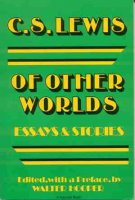 Of Other Worlds: Essays and Stories by C. S. Lewis, edited by Walter Hooper (Harcourt, Brace & Company, 1966)
Of Other Worlds: Essays and Stories by C. S. Lewis, edited by Walter Hooper (Harcourt, Brace & Company, 1966)
The essays in this collection (On Stories, On Three Ways of Writing for Children, Sometimes Fairy Stories May Say Best What's to Be Said, On Juvenile Tastes, It All Began with a Picture, On Criticism, On Science Fiction, A Reply to Professor Haldane, and Unreal Estates) are all included in C. S. Lewis: On Stories, which contains several additional essays as well, making the latter by far the more interesting book..
The remainder of this book consists of two little-known stories that were published in The Magazine of Fantasy and Science Fiction in the 1950's (The Shoddy Lands, Ministering Angels), one previously unpublished story (Forms of Things Unknown) and the beginnings of a novel inspired by the Trojan War (After Ten Years).
Forms of Things Unknown I enjoyed the most, for its clever, classical twist at the end, and because it alone has no female characters of any importance. The other three portray male attitudes toward women that lead me to despair of the human race. After Ten Years is nonetheless interesting, though only a fragment. Ministering Angels I wish I could forget. The Shoddy Lands has an appalling view of women, all the more so that I can tell from some of his non-fiction writings that it is somewhat reflective of Lewis's own experiences. Nonetheless, I find it the best of the four works, being an unforgettable portrayal of the self-centered blindness common to us all.

